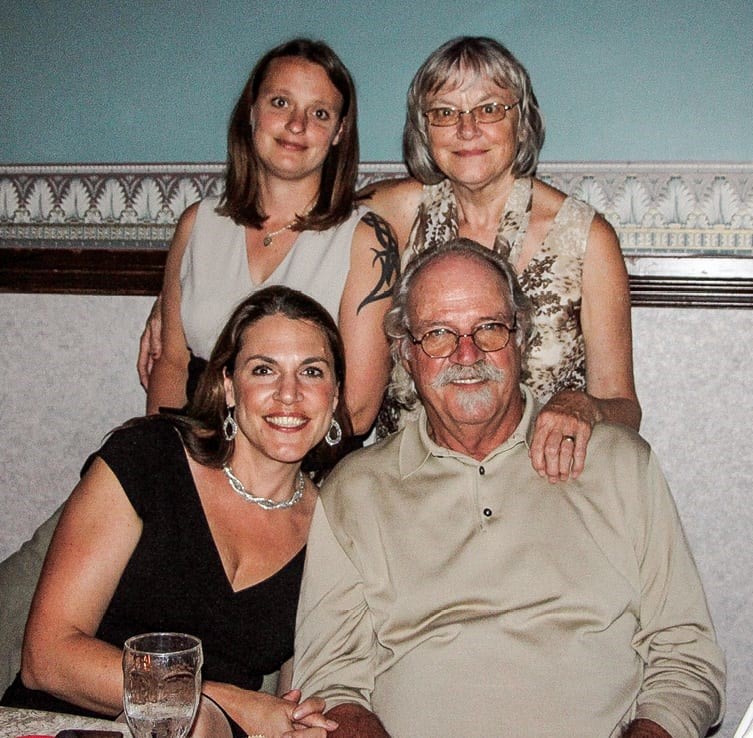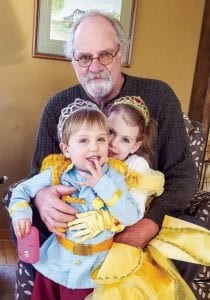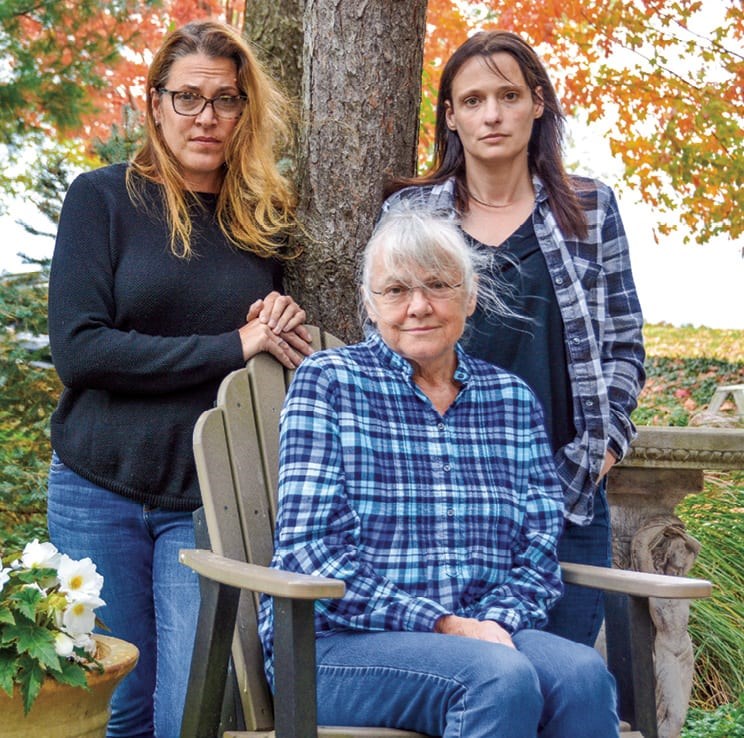A life remembered
Carpe Diem. A Latin aphorism, which translates to “seize the day.” Earl Clapp had the words tattooed on his wrist about 20 years ago, shortly after he had a heart attack. His wife, Tillie, and daughters Jodie and Elisha, said the health scare changed his perspective. His tattoo became a daily reminder to embrace with both arms those near and dear to him. To live in the moment. To offer a helping hand to a friend or stranger in need.
A group of Earl’s companions, with a penchant for gathering around an autumn campfire, had cocktail glasses produced, engraved with Carpe Diem and Earl's name, so as to offer toasts to their friend. A fitting tribute to a life well-lived.
Earl Clapp died on October 2, the victim of a robbery attempt. His body was found by a passing motorist on Highway 20, a kilometre and a half from his home in Fenwick.
Last week the Voice sat down with Earl’s family to get a sense of the man and his passions, the tragedy which befell him, and the aftermath for his loved ones.
Earl moved to Pelham from Sudbury 40 years ago with Tillie, and founded a successful business, Niagara Farm Metal Products. Decades later he remained healthy and robust, an active man who, at 74, still climbed roofs to make repairs. He had a knee replacement last year, and the other knee was due to be done this December. He had some issues walking down steps, and didn’t ride his beloved Harley-Davidson motorcycle much anymore.
A cherished Clapp family photograph has Earl standing next to his bike, wearing a black T-shirt with the message, “Life is simple. Eat. Sleep. Ride your Harley.” The large group of motorcyclists who participated in the drive-by procession at the Clapp home on Thanksgiving morning was testament to the friendships Earl had built within the two-wheeled community.

Tillie fondly remembers the days of touring by motorcycle.
“For many years, I rode as a passenger. Then one day my younger daughter Jodie said she wanted to learn how to ride a motorcycle, and I told her that I would take the course with her. The minute I got on the bike solo, I thought to myself, ‘That's it, my days on the back seat are over.’ And so from then onward I had my own bike, and we took lots of road trips. That was a big passion of Earl’s.”
His greatest affection, of course, was reserved for his family. Though both daughters had left Pelham (Jodie resides in Port Colborne, and Elisha in Orchard Park, New York), they were always in their father’s thoughts.
“He was so proud of his daughters,” said Tillie. “Both of them worked in the business when he was still doing construction, up on a ladder, cutting steel, whatever. And his grandchildren, Ella and Alex, were the light of his life. They loved their ‘Papa.’”

The business he built was a third devotion.
“Whether it was a Monday morning or a Saturday morning, it was all the same to him. He didn't think of it as getting up to go to work. It was a labour of love,” said Tillie.
Earl enjoyed the physical nature of the work, and the interaction with contractors. He had also reached a point that he was considering maybe getting a younger partner to help run the business, or perhaps even selling it off.
Tillie related details of that fateful night, imperfect and incomplete, given that no witnesses were present save the accused, who can hardly be trusted to provide the unvarnished truth.
Earl was sleeping with the bedroom window open, facing the area where some company trailers were stored a distance away. He had gone to bed early, but must have heard a noise sometime around midnight. Earl had a habit of getting up early, said Tillie.
“If the truck was not in the driveway when I awoke, I often would have no idea where he was. And even if the truck was there, he could have met a contractor, and they would have gone in another truck to a job site together. It wasn’t unusual for Earl.”
He had a new hydraulic dump trailer on the property, replacing one which was stolen in January 2019. After the initial theft, Earl hired a contractor to put in a strong set of gates, and bought some expensive locks.
Tillie had recommended installing surveillance cameras, but, as she recalls, Earl said, “You know what, Tillie? I'm not going to lie awake at night and worry about the trailers. I have insurance. I've done what I can. And that's it.”
Tillie thinks that if Earl knew there was someone down there attempting to steal the trailers, he would have woken her and called 911. She thinks he just heard a noise, and went to investigate.
What happened next is open to conjecture. Did the thieves panic in the dark when confronted? Was there a physical altercation? How did Earl end up being dragged for over a kilometre?
“They cared more about evading the police than running over a 74-year-old man who was on his own property, trying to see what the noise was. They chose not to stop and free him from underneath their vehicle, as they dragged my husband down the road,” said Tillie in an anguished tone.
Tillie doubts that Earl fought with the thieves.
“I was married to him for 53 years. I know my husband, and he was pretty wise. I can’t see him getting into a fight…he would know he wouldn’t be a match for two younger men.”
The grandkids received a sanitized version of what happened.
I know my husband, and he was pretty wise. I can’t see him getting into a fight…he would know he wouldn’t be a match for two younger men
“How do you tell a seven-year-old that their Papa has been ripped away in an instant?” asked Tillie.
The family realizes that at some time in the future, the individuals charged with this crime will be in court, and that there will likely be an opportunity to give victim-impact statements.
“I’m determined not to focus on [the men arrested],” said Tillie. “We did look them up online…we needed to get a sense of who they are. And the more I read, the more negative my impression. But I needed to see their faces.”
Tillie has compartmentalized her anger, to preserve her sanity.
“We were like zombies, those first few days,” she said, struggling for composure. “Earl and I were robbed of at least ten or 15 years together. So now I'm taking those horrible visions of those unsavory people, and I am putting them in a box. I'm letting the professionals — the police and the courts — deal with it. I'm going to concentrate on our daughters and our friends. My daughters idolized their father, and they will never be the same. We need time to grieve for Earl. And I want to concentrate on good things…not on those criminals.”
Jodie’s pain is more raw and livid.
“I hope they rot in prison for the rest of their lives. And I'm angry at the criminal justice system that lets these criminals out on parole, lets them out early. I have moments where I don't know how I can spend the rest of my life seeing these pictures in my head every day. There are times where I'm so angry that I don't know how to function…because I don't understand how anybody can do what they did to another human being. They could have stopped. Dad might have lived. What are they going to get, 15 years in prison? They took a big chunk out of our lives. It’s hard to understand how our peaceful existence intersected with these horrible people.”
Her eyes welling, Jodie described a poignant moment with father.
“Dad and I went to see a concert once, featuring Jonny Lang and Buddy Guy. Rock and blues music. Jonny played a song called Red Light, about stopping at a red light in your car, and thinking about your life.”
You sing a song, while sitting at a red light You think of home, while sitting at a red light Too slow to roll, put your life on hold An open path with nowhere to go You break the molds, when running through the tolls Speeding through your whole life A chance to breathe while sittin' at a red light You look around, reflecting on your life Should I keep going, lose the life that I love A second glance, when coming to a red light
“In my younger days, I had some struggles, some hard years,” said Jodie. “As the song was playing, I looked at Dad, and he looked at me, and we both had tears running down our cheeks. Because we'd been through a lot together, and I came out okay on the other side. I will never forget that moment. He was kind of a big, tough-looking guy with a beard, always wearing black shirts and jeans. But he was like Superman to me.”
Elisha stayed for part of the past summer in Fenwick, and has warm memories of getting up in the morning and seeing her kids cuddle in a chair with their Papa, driving the tractor around the yard with him, and working on a treehouse together.
“I was seeing all the special things we had when my sister and I were growing up with him…but this time with his grandkids,” she said.
The summer also allowed Elisha and her dad to enjoy some quality father-daughter time.
“We would sit out in the yard every night with glasses of wine, until the mosquitoes drove us inside. We would sit and talk for hours. And I when I got home to Orchard Park, I sent him a little citronella candle in the mail. I attached a note, saying how much I had enjoyed our talks. ‘Here's for next time,’ I wrote. And I'm so mad that now, there is no next time.”
We would sit out in the yard every night with glasses of wine, until the mosquitoes drove us inside
Tillie recalls Earl saying, “This is the best summer I've ever had. I just love sitting out here with my wine or my coffee and watching the birds and the butterflies, feeling the breeze through the trees, watching the sunset.” She is grateful that he had that experience.
The family received a card from a young woman who was a business acquaintance of Earl’s, in which she said that there are not a lot of men who are easy to deal with in the roofing industry. But from the first time she met Earl, he always treated her with kindness and respect. He helped her learn the ins and outs of metal roofing, and she always appreciated how willing he was to come to a site to offer a little extra help, or a fresh pair of eyes to ensure the job would run smoothly.
Tillie is effusive in her praise of the Niagara Regional Police, both for their sensitivity, and their dogged determination to track down those responsible for Earl’s death.
“I saw them in the driveway at 8:30 AM, the morning of October 2, looking very somber, walking up to the house. They asked me to sit down, and I could sense what was coming next. It was like a nightmare that I will never wake up from.”
The Clapps were prepared for the long haul, anticipating a lengthy police investigation to produce leads, evidence, witnesses. And yet it took just eight days to make arrests. The police were working around the clock, and are still searching for a black Ford Expedition implicated in the case.
“The police said they never had a case with as much community cooperation,” said Tillie. “People were calling just to say, ‘What can we do to help?’ The police told me they ordered food from a local restaurant, and when they went to pay the bill, the restaurant owner wouldn't take any money from them, on account of the non-stop work they were putting in to find Earl’s killers.”
Jodie is perhaps having the hardest time adjusting to the new reality of life without her father.
“The only reason I can get out of bed in the morning is because I know Dad would want it. He would say that in life, things happen to you, and you have to just accept them and move on. But as far as I'm concerned, my world has stopped revolving. I don't know how to live in a world where this kind of thing happens. It’s just so unfair. Dad helped so many people with random acts of kindness.”
A source of comfort for the family is the way the Pelham community supported them on Thanksgiving morning, with a procession of hundreds of vehicles past their home at 1351 Centre Street.
“It was beautiful,” said Tillie. “After the procession, we talked about how cathartic it was...better than a funeral. We've received gift baskets from people I don't know, meal certificates from restaurants. They didn't do it with an expectation of anyone knowing about their good deeds.”
A man in a classic 1962 Chevy convertible was last in the procession on Thanksgiving morning. He stopped and got out of his car, and embraced the family.
“He’s a dear friend, who lost his son a few years ago, with whom I was very close,” said Jodie. “That man is like another dad to me. And he wanted to be last in the drive-by. He told us that the year that Chevy was manufactured, Dad would have been 16 years old, and would have just gotten his driver's license. Dad loved vintage cars.”
Tillie smiled as she noted that another vehicle in the procession had been a rusty old truck from the 1950s, stripped clean of its coat of paint.
“I’d sometimes find Earl hunched over his computer at night, searching websites for old trucks that needed to be restored,” she said. “He was always looking for projects, to bring something back to life.”
Earl never got his rusty old truck.
There are small, intimate traditions Earl and Tillie shared that are now lost, such as their habit of watching a foreign film with supper each night.
“Every morning when I wake up, for a split second I forget he’s gone, but then reality just comes flooding back,” said Tillie. “My husband was a guy who built playground equipment for schools, and forgave business loans if somebody was going through a tough time. Stuff that he didn't want anyone to know about.”

Tillie continues to cling to the treasured memories of the past half century with her husband.
“I loved our life. Earl made me feel so cherished, so special, like he felt he was lucky to have married me. And I felt the same way about him. The big thing that I remember when I first met him was his character. He was handsome, in a Tab Hunter kind of way. But it was his character that attracted me to him.”
Pelham has lost a good man to a senseless act, a glaring juxtaposition on a beautiful autumn day. As hard as it is to reconcile, Tillie Clapp still had the strength to say, with resolve in her voice, “We still need to find that black Ford Expedition.” ◆


